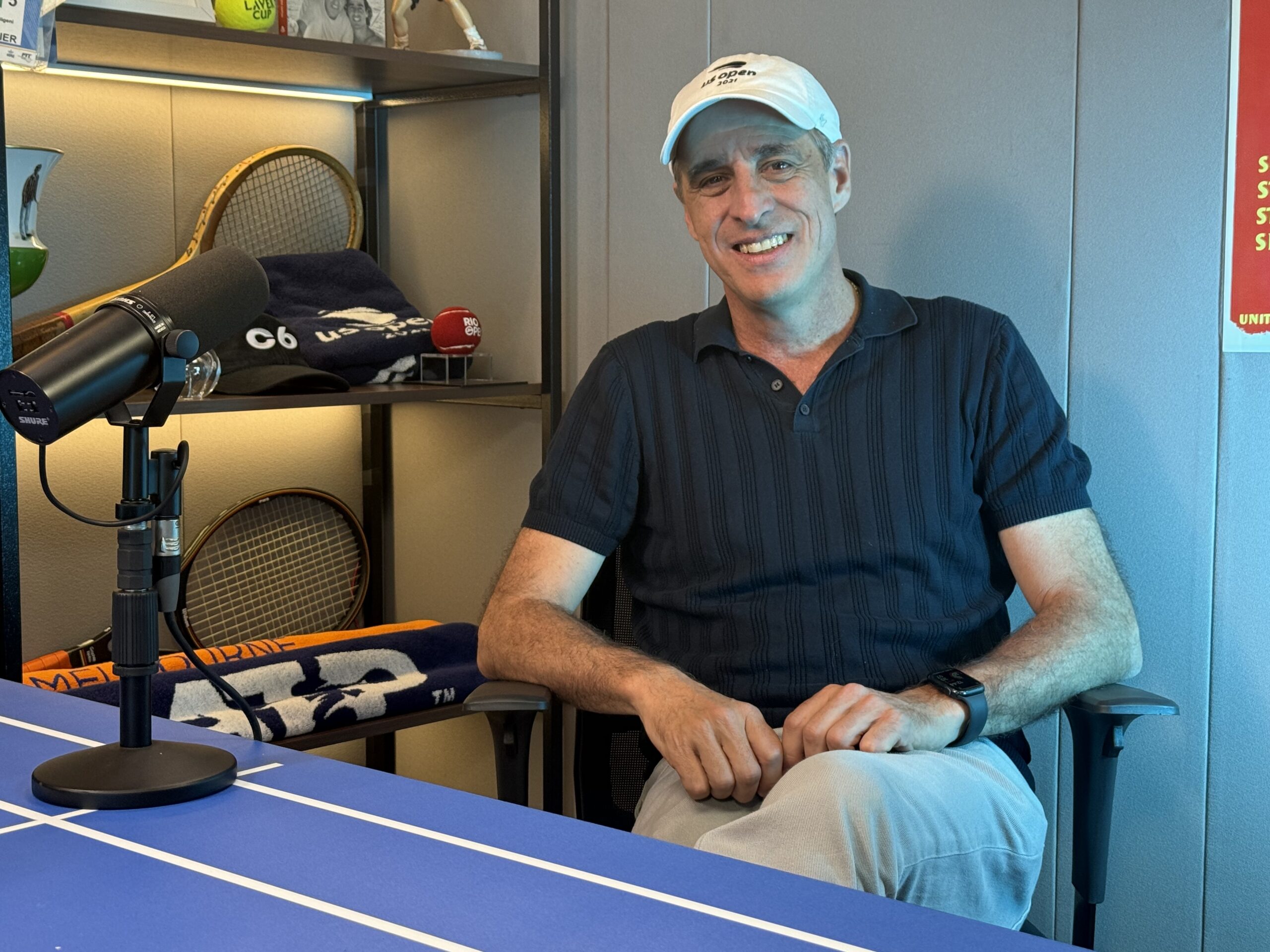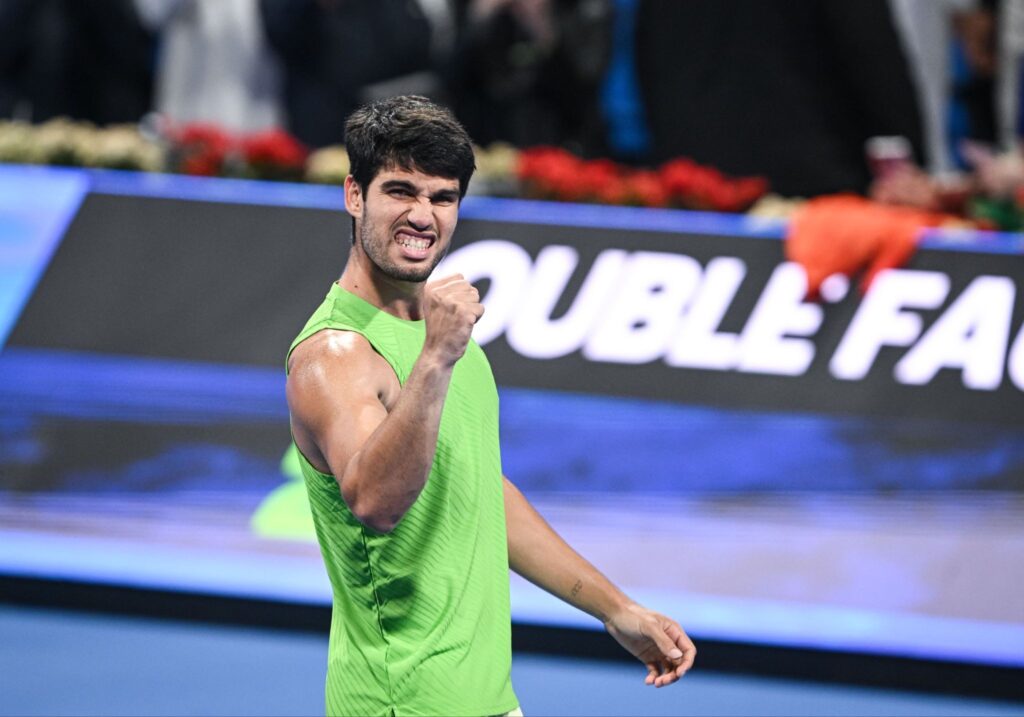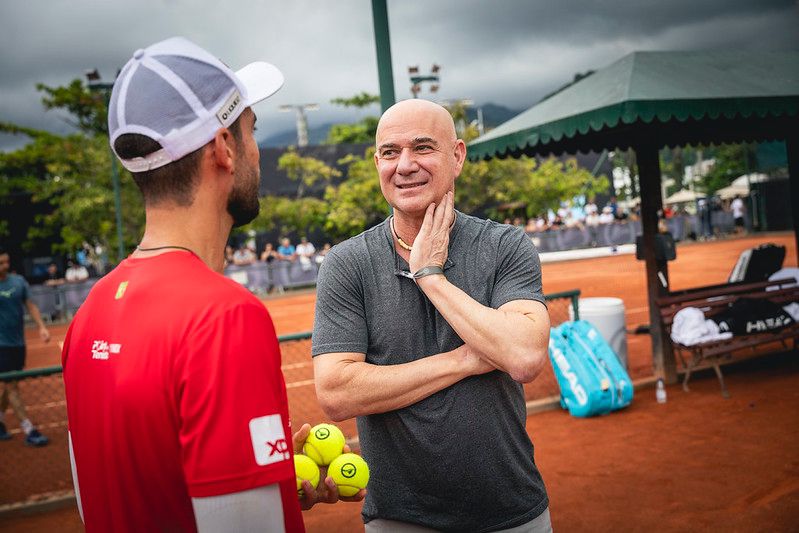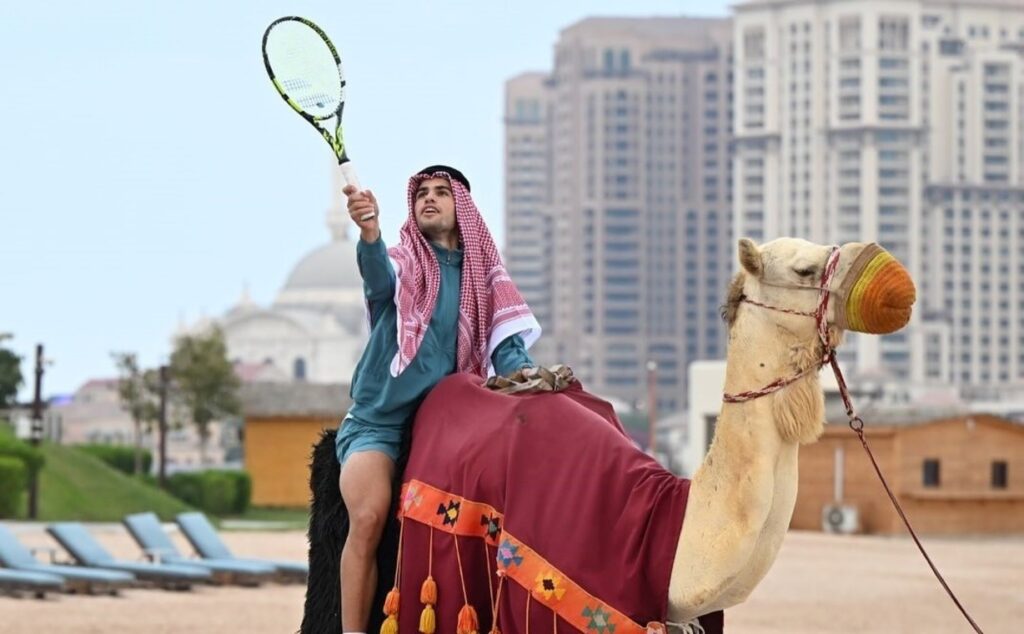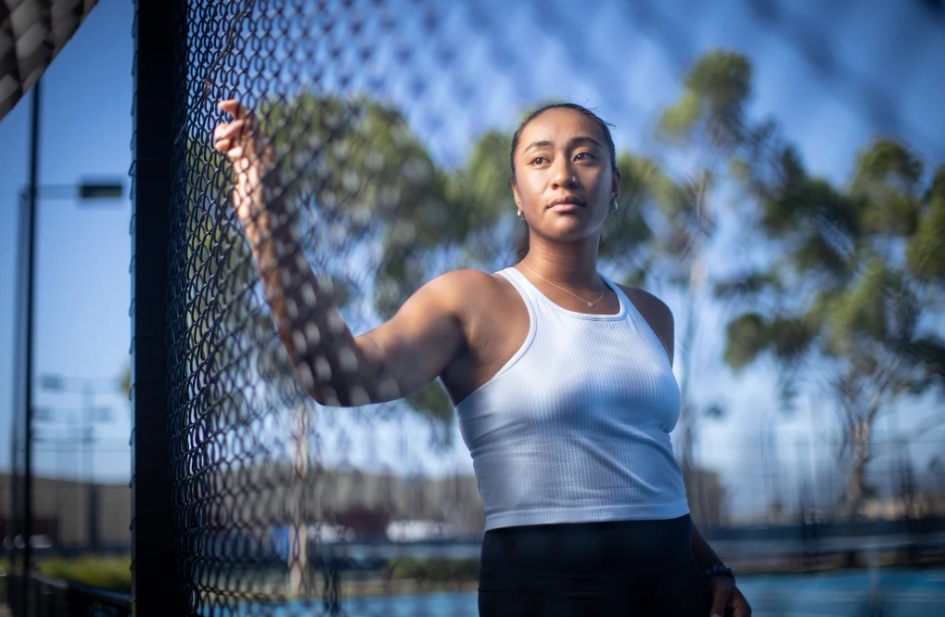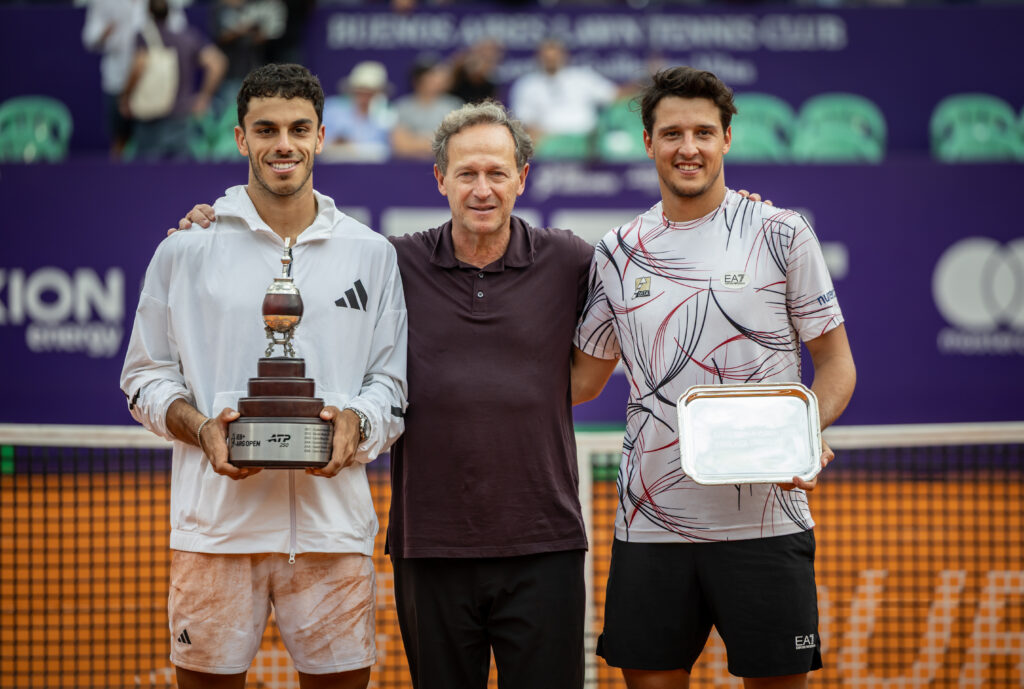SÃO PAULO – There was a time when Roger Federer‘s coach was looking for tennis players to practise with the Swiss player and the response he received was a resounding ‘no’.
‘Peter Lundgren, Federer’s coach, asked us to play with him. And we didn’t want to,’ said former Brazilian tennis player Fernando Meligeni during an interview with CLAY in Sao Paulo.
‘“Federer isn’t good, Federer doesn’t play that much,” we said to each other. And we said no,’ added the 1999 Roland Garros semi-finalist, who reached 25th in the ATP world rankings.
‘Federer broke everything, he was too nervous.’
In the second and final part of the interview with CLAY, also published in RG Media, the 54-year-old Brazilian also reveals little-known details of his dislike for Andrea Gaudenzi, a player of his generation and now president of the ATP.
Meligeni, born in Argentina, also dives into the character of Carlos Alcaraz and his taste for nightlife and enjoying life beyond tennis.
Interview with Fernando Meligeni
– At what age did you move to Brazil?
– At the age of four, in 1975.
– But you played for Argentina as a junior…
– I was number one in the world as a junior, and at the age of 15 I left Brazil to train in Argentina, to gain experience there. At 18, I decided I wanted to play for Brazil. In Argentina, I was “the Brazilian” and in Brazil, “the Argentine”. I was in the middle and was nothing. When I was 14, I went to play in a tournament in Argentina and they wouldn’t let me because they said I wasn’t Argentine, even though I had Argentine documents. It was Jorge Cano, from the Argentine Tennis Association (AAT).
– You presented your Argentine ID card and they told you that you weren’t Argentine?
– It happened to me a lot. When I was 15 or 16, I played in a tournament at the Banco Nación Club, I made it through the qualifiers, I was matched against Diego Del Río in the first round, and they told me again that I was Brazilian and couldn’t play. Luckily, my mum was there, she showed them my ID card and I was able to play. I won the tournament. When I was 18, the president of the Brazilian Tennis Confederation wouldn’t let me play in the South American Cosat circuit for Brazil. Argentina let me play, and I won in Bolivia, Chile, Argentina, the Banana Bowl in Peru… I won five tournaments and became number one in South America. Then, as world junior number one, Brazil wouldn’t let me play because I was Argentine. That’s how it was, in Argentina they wouldn’t let me play and I had to show my ID because I was Brazilian, and in Brazil they wouldn’t let me play because I was Argentine.
– And then?
– At one point I told my old man that I was going to become a Brazilian citizen. My mum went crazy. She said, ‘No, you’re crazy, I’m not going to help you, do it yourself, it’s your decision.’ My mother was more Argentine than anyone you can imagine. My mum, my dad, my sister… No one could accept it. And of course, my parents came to Brazil when they were 40 years old, they couldn’t stop being Argentine.
– By wanting to become a Brazilian citizen, you lost your Argentine nationality, right?
– That’s the thing! At that time, Mercosur didn’t exist, I had to do a lot of paperwork to obtain naturalisation and I had to hand in my Argentine document. Today I don’t have an Argentine document. No passport, no ID card. I have nothing. There’s a funny story about when I took my girlfriend, Carol, whom I later married, to Argentina for the first time. I handed over my Brazilian passport at immigration control and the guy looked at me and said, ‘Argentinean?’ And I said, ‘No, Brazilian, I’m a naturalised Brazilian.’ He insisted and said, ‘What about your Argentinean documents?’ And I said, ‘I don’t have any, I’m Brazilian.’ But I wasn’t confronting him, I was just telling the truth. He looked at me and said, as he closed my passport, ‘Kid, understand one thing. An Argentine never stops being Argentine.’ And I said, ‘Yes, sir, okay, sir, but let me in!’
– In the round of 16 of the 1990 World Cup, when Argentina defeated Brazil, who were you rooting for?
– I always remember that when Argentina won the World Cup in 1986, my old man had photos of Argentina and its players, and I was rooting for them… I think I’d have to be a big liar to say that in football you leave one side and start loving the other. If you ask me today how I see football, I’ll tell you that from a distance, without emotion.
– Why? Because it gets into the issue of your two nationalities, your two origins, and so it’s better to stay away from football?
– Yes. Of course I want Brazil to win, of course I want Argentina to win. If both are playing, I’m much more for Brazil, of course, because I’ve spent my whole life in Brazil now. It’s logical, but I don’t have the same passion as someone who is a football fan.
– And at the same time, I imagine it still means something to you.
– Look, if you ask me what my biggest fear was when I played tennis, it was that one day the Davis Cup draw would be Brazil-Argentina and I would play for Brazil in Argentina. Luckily, it never happened, I don’t know how it would have been.
– What would it have been like?
– They booed me… I’ll never forget it. Playing in Argentina, on the centre court of the Buenos Aires Lawn Tennis Club against Agustín Calleri. ‘Brasilleño botón, brasileño botón, sos un hijo de puta, la puta madre que te parió’ (Brazilian bastard, Brazilian bastard, you’re a son of a bitch, the bitch who gave birth to you). Half the stadium was chanting that. It hurt, you felt bad. Because I have affection for Argentina. I’m Brazilian, but I’ll never lose my love for Argentina.
– Isn’t the rivalry between Argentina and Brazil more intense and stronger than that between Brazil and Argentina?
– Now Argentina is winning more in football, and so the rivalry is changing. It’s one thing to have a rivalry when you’re always losing and your rival has five World Cup titles, and another when you start winning more. I’m the kind of guy who fights with everyone when they speak ill of Argentina; it’s something I won’t allow. I always say that we are very similar, we always have the same problems, the same political problems, the same social problems. They are two different countries, Brazil is very big, Argentina is smaller, but we have the same problems. A guy who is in his 50s, like me, has seen Argentina at its best, Argentina at its worst, Brazil at its best, Brazil at its worst, and we fight over nonsense.
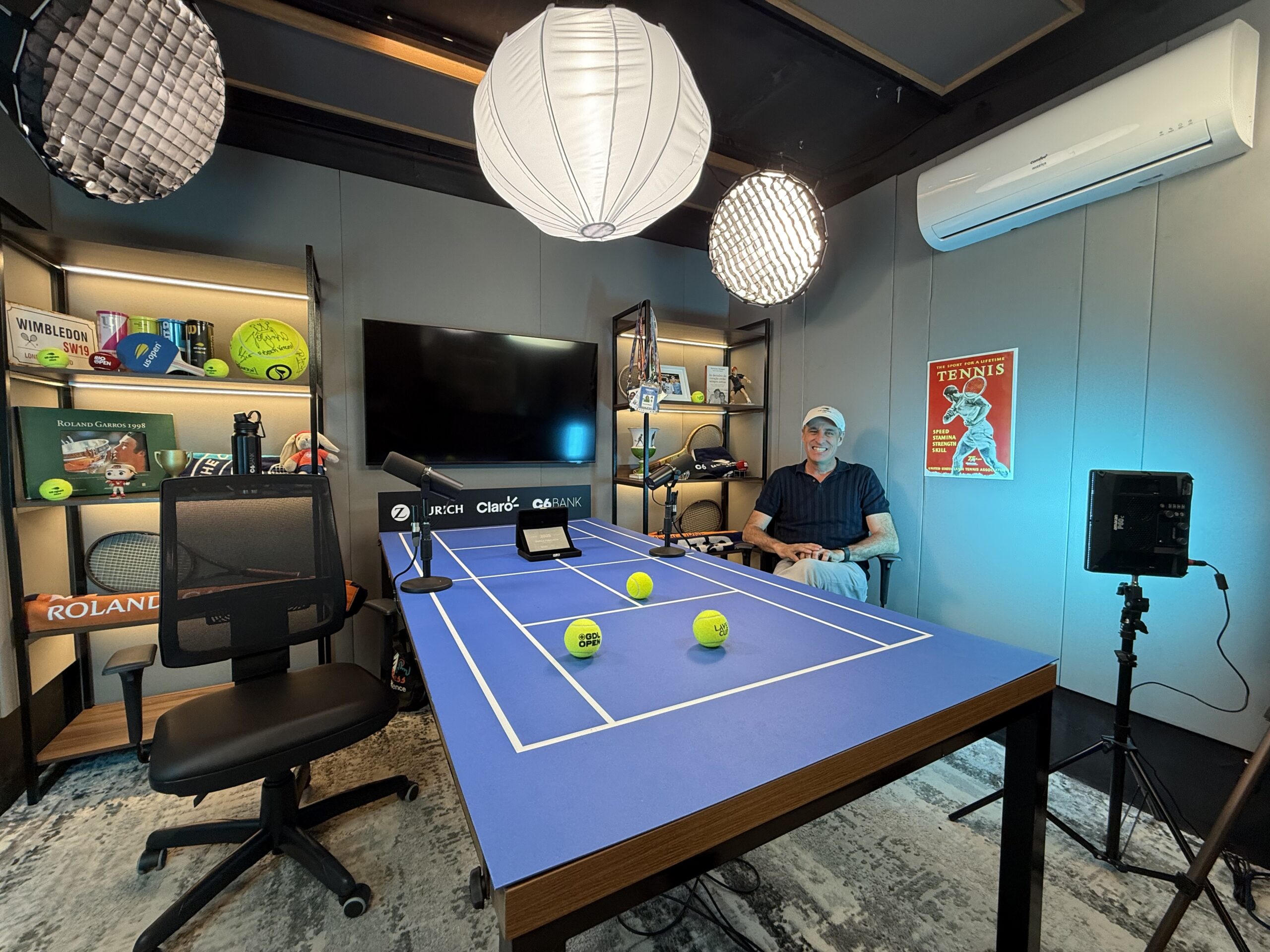
– Let’s talk about tennis today. We had the Nadal, Federer, Djokovic trilogy, and now we have Alcaraz-Sinner. When you watch Alcaraz and Sinner, what do you see?
– I see a very high level, but I see a very big difference between the two that we haven’t had in tennis for a long time. When we were playing, in the era of Sampras and Agassi, you looked at the top ten and it was much tougher than it was with the “Big Three”. Of course, they are the best players in history, which may be why they stood out from the rest. But there was a difference with the fourth, Murray, and even more so with the fifth and sixth. Today, the difference between the top two and the rest is enormous. Alcaraz and Sinner, if they don’t have any problems, will be there for years. They will be in eight out of ten finals. At the rate they’re going, they’re going to threaten the Big Three’s record of 20-22-24. At the rate they’re going… if they feel like doing nothing with their lives for 20 years, which for me is the great triumph of Nadal, Federer and Djokovic: the three of them, in addition to playing good tennis, lasted 20 years, lived for the sport. Because let’s not lie to ourselves, you have to live for the sport, which is the argument put forward by Alcaraz in [the documentary] ‘A mi manera’ (My Way).
– What do you think of what Alcaraz says?
– I think he’s saying, ‘This is as far as I’m going. Whether this gives me 20 Grand Slams or 15, this is who I am.’ And I think Juanca [Alcaraz’s coach, Juan Carlos Ferrero], who is a great guy, initially wanted to do things his way, but then he realised that to keep Alcaraz, he has to do things a little bit his way too, Carlos’s way. That’s what being a great coach is all about. If I train you tomorrow, I can’t impose on you how I think you should play, how I think you should live, whether you should go out at night, whether you should drink beer or not. You have to understand, especially with a kid who is no longer 15 years old, who you tell things and he responds with ‘yes, sir’. At 17, he says, ‘Yes, that’s right,’ and at 20, he says, ‘But why, can you explain it to me?’ And at 22, he says, ‘No, no, no, coach, I don’t think so, I’m going to do this.’ And at 25, he says, ‘Shut up, this is what I do.’
– Well, tennis is a sport in which the athlete is the boss of their coach, even the one who pays them. It’s not like football.
– Yes, but it also depends on your age. I had that with Ricardo (Acioly), my great coach and now great friend. Today we laugh about it because he took me on when I was ranked 100th in the world and didn’t understand much about tennis yet. Everything he said to me, I replied with a ‘yes, Ricardo, let’s go, let’s go!’. And when I reached the semi-finals of Roland Garros, ranked 25th in the world and won three ATP titles, I changed and had a say. He told me to serve with my forehand, and I told him no, that I served with my backhand. And when he asked me why, I told him that he saw it from the outside, but that I, on the inside, knew that the right thing to do was to serve with my backhand.
– It’s logical, it’s a bit like when a son grows up and starts arguing with his father about things.
– That’s right, that’s right. So, that’s how I see Alcaraz. Juan. Carlos took him on when he was 13 years old. It was all “yes sir, yes sir, yes sir”. And now it’s not like that, now I want to go to Ibiza and party, but on Monday I’ll be back and you can give me a hard time if I don’t deliver.
– Does that “my way, Alcaraz” boil down to partying? Or is it more than that?
– It’s more than that. Let’s see. That “my way” is the schedule, it’s how much, it’s how. The truth is, the problem between the player and the coach is about commitment, how much you’re going to commit. Logically, the nightlife and booze are one of the most important things. But then there’s everything else. How much is the family going to be involved? Alcaraz’s family is all in. Will Juanqui want Alcaraz’s brother on the team? I don’t know.
– But who won that war? My way or your way?
– “My way” won. And today you have the lad [Alcaraz’s brother], you have the father. And then you also have a story that is very important to me, which is that of (Albert) Molina, who is Alcaraz’s manager. You have to play in this tournament because it will earn you a million dollars. And Alcaraz says, “I don’t want to”. Whether you like it or not, you’re taking $100,000 or $150,000 from someone. I don’t know what percentage Molina charges.
– The more tournaments he accepts, the more you earn.
– Yes. Because you’re a business. You play in Doha and they pay you a guaranteed million dollars. Of that million dollars, I don’t know how much goes to Juan Carlos, I don’t know how much goes to the manager. And if you, as a player, say no, nobody wins. ‘My way’ is also about saying no.
– Anyway, Alcaraz is playing quite a few exhibitions.
– Who doesn’t like money? Go and play, I’m going to win £100,000, go and play, I’m going to win £50,000.
– Alcaraz, precisely, complains that the circuit is very demanding and the calendar very long, but he adds exhibitions.
– It’s not just the nightlife, it’s everything. From a guarantee to play a tournament to the calendar, training, holidays, girlfriend, going out at night… You have a million things, decisions, that the coach with the player, with the manager, are discussing all day long.
– Does tennis today have the same personality as it did in the 90s and 80s? Or are they all more formatted, in a way?
– It’s more professional. It’s much more professional. Before, there wasn’t as much money. For playing the first round of a Grand Slam, you got £5,000; today it’s £110,000. I won £120,000 for that Roland Garros semi-final; today they get a million, eight or ten times more. When I played, I would go back to Brazil and have dinner with one of my sponsors. Today, players have ten sponsors and twenty things to do. So, the life of a tennis player today has to be professional. Before, we played and then went back to Brazil to see our family and friends. Today, players take their family and friends to tournaments. Players today are a business, a large multinational company. We were a tiny company.
– During your playing days, you were outgoing, you played a lot with the crowd, you liked to talk to the media. Would you have enjoyed and taken advantage of this era of social media?
– Yes, today it would be fun, today I would have a lot of influence. Because I knew how far I could go. I always got along very well with journalists, I always treated them fairly.
– I asked Kuerten about this in February in an interview in Rio de Janeiro and he told me that if social media had existed in the late 1990s, he would not have won Roland Garros.
– Because Guga never liked confrontation, he never liked fighting. He didn’t go head-to-head with people, he always put someone in the middle. Because that’s his nature and you have to respect that. I always say that: respect who you’re talking to. Ah, but Guga could do it, people say. But then he wouldn’t be Guga. But Fernando should! But then he wouldn’t be Fernando. It’s my big fight in tennis, in Brazilian tennis. Take the kids, all the players and former players, and ask them to give what they can give. If Guga gives you 15 minutes of talk for the juniors, I applauded and put all tennis on that day so they could listen to Guga. They tell me all day long when I’m going to train someone. And I say, why the hell am I going to coach someone? I’m not going to have a podcast, I’m not going to be on TV, I’m not going to write. I’m going to live for the kid I coach…
– I interviewed Cafú a few days ago and he told me that he would have gone crazy if he had had to deal with social media during his playing days. You seem to be an exception in that generation.
– It’s just that I know how far to go. Have you ever seen me talk about politics? No. Have you ever seen me talk about religion? No. I once asked someone at ESPN who is very knowledgeable about social media, ‘What are the limits of what we can talk about on social media?’ And he said, “I’ll give you a very simple answer: you have to talk about what you talk about. How many times in the last two years have you talked about politics?‘ And I said, ’Never.” And that’s the key. Why am I going to get involved on social media with the Bolsonaro and Lula issue? Why get involved if it’s not your issue?
– Because of the addiction to likes…
– Because of the addiction to likes. And they kill you, they kill you. You never talked about religion, and now you’re giving your opinion on Israel and Gaza. For or against.
– That’s where you lose your aura.
– Of course. If you want to talk about religion, start talking. Until a point where you’re always talking, and now you’re going to talk about Israel and Gaza. Great, now you have a reason to talk, you can talk about politics. Now you’re going to talk about Lula and Bolsonaro. Well, you want to talk, talk. But if you appear out of nowhere and start talking, you only lose, because you’re a total outsider. I don’t talk about politics because it’s not my thing, although I have my opinion. As far as I’m concerned, I’d put them all in a bin bag, because it’s a total mess in Brazil and Argentina.
– Let’s get back to tennis. What’s this about Federer being a bad player?
– We were in Hamburg and Peter Lundgren, Federer’s coach, asked us to play with him. And we didn’t want to. ‘Federer isn’t good, Federer doesn’t play that much.’ And we said no.
– That would be in 2001, 2002.
– Yes. And I only played with him once, in doubles against him. I was playing with (Anthony) Dupuis, a Frenchman. And he was playing with (Yves) Allegro. It was in the second round of the Australian Open, and you could already tell he was playing really well [Editor’s note: it was in the second round of the 2003 Australian Open, and the Swiss pair won 6-3, 6-4].
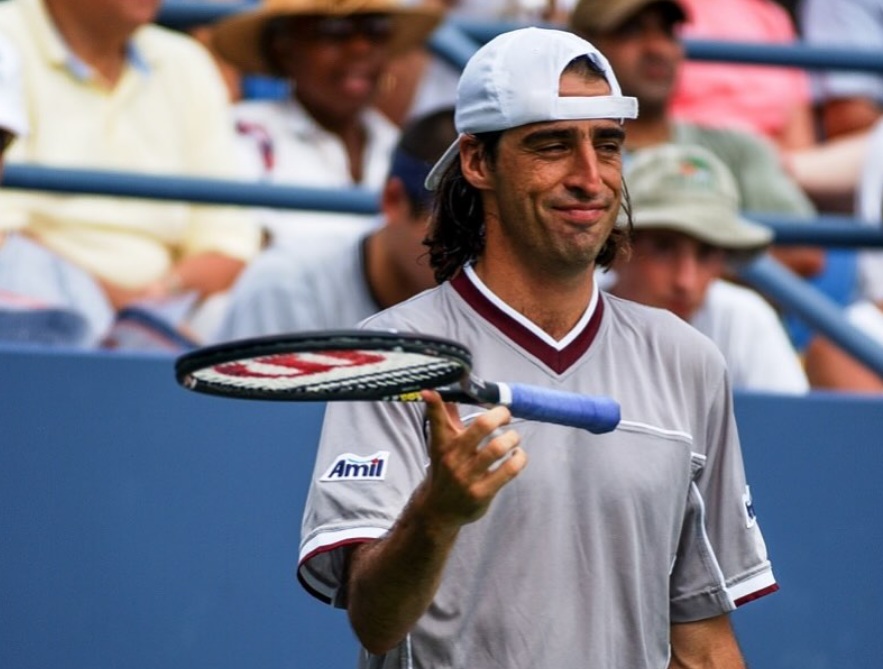
– When you and your colleagues said that Federer wasn’t good, why did you say that?
– First, because he broke everything, he was too nervous. His backhand was pretty bad, weak. And we played on clay, which he didn’t play so well on either. Then he started playing better on hard courts and clay came later. But that’s typical. When Nadal appeared, I met him when he was 15 in Aix-en-Provence. He reached the final, I lost in the quarter-finals or semi-finals, and we had a chat in the changing room. You could tell that the kid played really well and that he was going to be great. Alex Corretja told us, ‘This kid is going to be number one in the world.’ Sure, sure. And when I saw him play, I knew: this kid plays like crazy.
– What a difference, right? Because the image of Federer as Swiss perfection and Nadal as a passionate Latino took hold. And it’s a lie, because Federer was the undisciplined one and Nadal was the player trained Prussian-style by his uncle Toni.
– And it’s a lie! Nadal didn’t do it because he wasn’t allowed to. That’s funny. Chat with Toni for an afternoon during one of his visits to Brazil and you’ll realise how strict he is, just like Larry (Pasos) was with Guga. And just like I think Juanqui (Ferrero) is and has been for a long time with Alcaraz. The difference is that I can see that Carlos wants a different world to the one Rafa had.
– They’re very different. Alcaraz enjoys the show, plays with the show, promotes it. And he tells you that his goal is to win 42 Grand Slam tournaments and be the greatest of all time. If Nadal said that, Toni would cut his head off.
– That’s right. They have very different personalities.
– What happened between you and Andrea Gaudenzi?
– We played in the quarter-finals of a tournament in Mexico [Editor’s note: in 1996]. He was beating me 5-1 in the third set. We always teased each other, we never liked each other. Never. And he left the ball in the middle of the court and I hit it with a forehand to his chest with all my strength. The ball hit him in the chest, bounced back and hit my hand. I grabbed the ball with my hand and threw it at his head. I also hit him in the head by throwing it with my hand.
– Did you hit Gaudenzi in the head?
– Yes. He hurled insults at me, I did the same, and the umpire gave me a warning. It was logical, although he should have sent me off. I beat him 7-5 in the third set. We almost killed each other on the way from the court to the changing rooms, and we almost fought again.
– Have you seen each other again in recent years?
– We played each other a few more times, he beat me and I beat him. We never got along. Now he’s president [of the ATP]. I don’t know what to do, he might not let me enter [the tournaments]!
